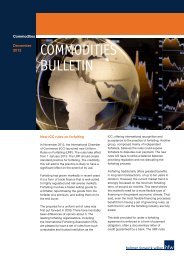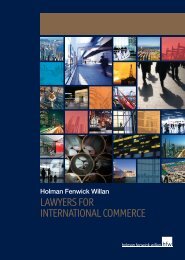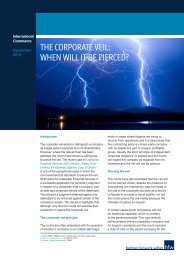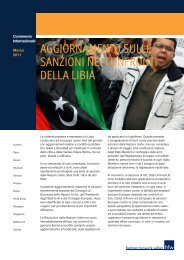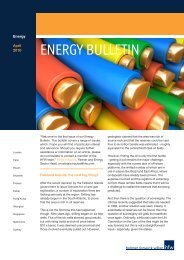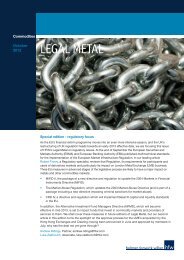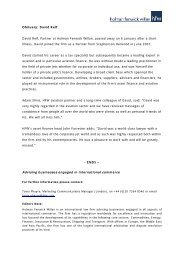Download file as PDF - HFW
Download file as PDF - HFW
Download file as PDF - HFW
- No tags were found...
Create successful ePaper yourself
Turn your PDF publications into a flip-book with our unique Google optimized e-Paper software.
ShippingJune2012A NOT SO PRIVATE ARBITRATIONThis article first appeared in Fairplay on 17 May 2012 and is reproduced with their kind permission.www.fairplay.co.ukWithout much fanfare, the 11th edition of the keysalvage industry standard contract, Lloyd’s OpenForm (LOF 2011), w<strong>as</strong> published at the end ofl<strong>as</strong>t year. It introduced some welcome changes,although several received little publicity.The changes were designed to bring the form upto date and reduce time and cost in dealing withcontainer ship c<strong>as</strong>es. The key change relates tocontainer ship salvage c<strong>as</strong>es, with the new formseeking to make the process of dealing withthese far more manageable.Previously, in the c<strong>as</strong>e of large container shipswith hundreds of cargo owners, notice of thearbitration had to be given to each cargo ownerfor any award to be binding.Given that today vessels regularly carry morethan 15,000 boxes, the problem of notifyingand attempting to settle with each cargoowner is both time consuming and oftendisproportionately expensive to the sums indispute.Under LOF 2011, notices in respect of salvedcargo may be sent to the party or parties thathave provided salvage security in respect ofthat property, namely, the cargo insurers. Thiswill greatly expedite and reduce the costs ofprogressing and running a salvage arbitration forowners and salvors.A rather less known change is that LOF 2011,in an attempt to provide better statisticsand access, now requires notification toLloyd’s Salvage Arbitration Branch, which willsubsequently publish all LOF awards, withcertain exceptions.Under LOF 2011, notification of its use must beprovided to Lloyd’s - Lloyd’s Salvage ArbitrationBranch will administe r this free of charge -mainly so the level of use of the contract may begauged and more accurate statistics kept.Previously, awards were confidential between theparties, replicating the usual system of privatearbitration that ensured the parties did not haveto air their dirty laundry in public. However, under
LOF 2011, awards, together withre<strong>as</strong>ons, will be publicly accessible vi<strong>as</strong>ubscription to the Lloyd’s website.The stated aim of this change is tomake the market more transparentand inclusive for salvors and propertyunder writers and to promote earlysettlement discussions betweenthe parties. All well and good, youmay think, but it does bring withit certain dangers regarding thedisclosure of evidence concerning thecircumstances of the salvage.Owners are unlikely to want this to bein the public domain because it mayfuel further litigation with charterersand/or cargo interests if, for example,evidence of the initial state of thec<strong>as</strong>ualty or its cause could potentiallygive rise to unseaworthines s or grossnegligence arguments.The parties can, however, apply to thearbitrator to prevent publication of anaward where there is ‘good re<strong>as</strong>on’for withholding it. It is likely that theseapplications will relate to specificcommercially sensitive informationa party wishes to keep confidential,rather than any general concern. Itseems likely that in most c<strong>as</strong>es aparty will wish the award to remainconfidential. This is equally true forsalvors where negligence or a failureto exercise best endeavours h<strong>as</strong> beenalleged.Other new provisions under therenewed LOF help reduce theadministrative burden, greatly speedup the process and of course reducecosts.One example is the problem forsalvors of a container vessel in tryingto reach a settlement with all cargointerests, particularly those that arenot represented. Without a settlementbeing agreed with all cargo interests,the salvors often have little choice butto progress the arbitration.Under LOF 2011, where an agreementis reached between the salvorsand the owners of at le<strong>as</strong>t 75% ofthe value of the salved cargo, thatagreement will be binding on allowners of salved cargo.Additionally, an arbitrator may noworder that cargo below a certain figureis omitted from the salved fund andexcused liability. This applies wherethe costs of including the cargo in thefund is disproportionate to its liabilityfor salvage. The award may then beproportionately split between theremaining parties.Clearly, these new provisions help, butparties should stay alert to the newdisclosure rules.Given these rules, it is important forparties to ensure <strong>as</strong> far <strong>as</strong> possiblethat, first, legal privilege over evidenceis preserved following the salvageoperation; and, second, that it iscarefully considered for relevance, toprevent the unfortunate situation ofa party disclosing information it doesnot want in the public domain and thatw<strong>as</strong> not necessary for the purpose ofthe arbitration.For further information, ple<strong>as</strong>econtact Toby Stephens, Partner,on +44 (0)20 7264 8366 ortoby.stephens@hfw.com, or yourusual contact at <strong>HFW</strong>.Lawyers for international commerce hfw.comHOLMAN FENWICK WILLAN LLPFriary Court, 65 Crutched FriarsLondon EC3N 2AEUnited KingdomT: +44 (0)20 7264 8000F: +44 (0)20 7264 8888© 2012 Holman Fenwick Willan LLP. All rights reservedWhilst every care h<strong>as</strong> been taken to ensure the accuracy of this information at the time of publication, the information is intended <strong>as</strong> guidance only. It should not beconsidered <strong>as</strong> legal advice.Holman Fenwick Willan LLP is the Data Controller for any data that it holds about you. To correct your personal details or change your mailing preferences ple<strong>as</strong>econtact Craig Martin on +44 (0)20 7264 8109 or email craig.martin@hfw.com



